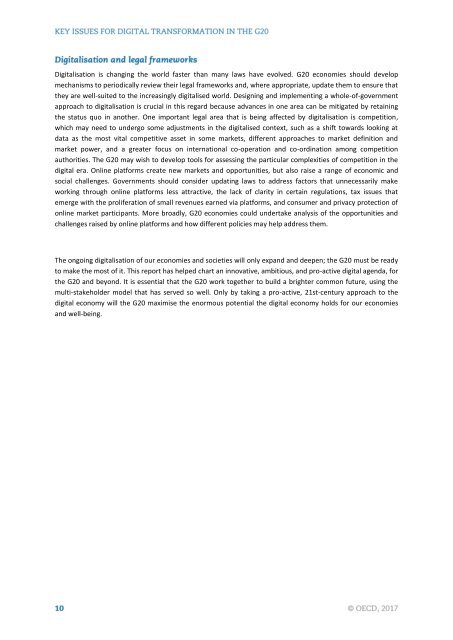KEY ISSUES FOR DIGITAL TRANSFORMATION IN THE G20
2jz0oUm
2jz0oUm
You also want an ePaper? Increase the reach of your titles
YUMPU automatically turns print PDFs into web optimized ePapers that Google loves.
Digitalisation is changing the world faster than many laws have evolved. <strong>G20</strong> economies should develop<br />
mechanisms to periodically review their legal frameworks and, where appropriate, update them to ensure that<br />
they are well-suited to the increasingly digitalised world. Designing and implementing a whole-of-government<br />
approach to digitalisation is crucial in this regard because advances in one area can be mitigated by retaining<br />
the status quo in another. One important legal area that is being affected by digitalisation is competition,<br />
which may need to undergo some adjustments in the digitalised context, such as a shift towards looking at<br />
data as the most vital competitive asset in some markets, different approaches to market definition and<br />
market power, and a greater focus on international co-operation and co-ordination among competition<br />
authorities. The <strong>G20</strong> may wish to develop tools for assessing the particular complexities of competition in the<br />
digital era. Online platforms create new markets and opportunities, but also raise a range of economic and<br />
social challenges. Governments should consider updating laws to address factors that unnecessarily make<br />
working through online platforms less attractive, the lack of clarity in certain regulations, tax issues that<br />
emerge with the proliferation of small revenues earned via platforms, and consumer and privacy protection of<br />
online market participants. More broadly, <strong>G20</strong> economies could undertake analysis of the opportunities and<br />
challenges raised by online platforms and how different policies may help address them.<br />
The ongoing digitalisation of our economies and societies will only expand and deepen; the <strong>G20</strong> must be ready<br />
to make the most of it. This report has helped chart an innovative, ambitious, and pro-active digital agenda, for<br />
the <strong>G20</strong> and beyond. It is essential that the <strong>G20</strong> work together to build a brighter common future, using the<br />
multi-stakeholder model that has served so well. Only by taking a pro-active, 21st-century approach to the<br />
digital economy will the <strong>G20</strong> maximise the enormous potential the digital economy holds for our economies<br />
and well-being.


